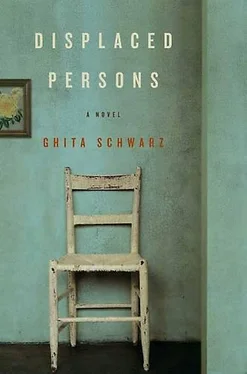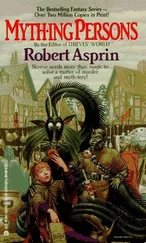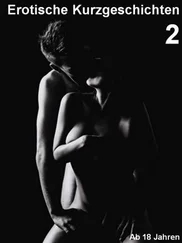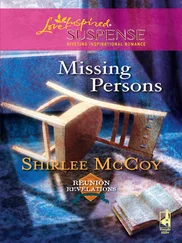“Jesus,” the soldier said. A familiar word! It made Sima want to laugh in recognition, but she stopped herself. The soldier tapped his knuckles to his temples and his face turned a bit pink. She would be quiet.
Finally he seemed to give up. A second soldier, who had been glancing over at them as they stood still, refusing to separate, rolled his eyes at his companion. He said something low, and the first one chuckled, shaking his head. Sima’s mother threw her father a wink: they had triumphed. All together, a threesome, they shuffled to a corner of the room, behind a gray curtain that hung from hooks in the ceiling. A short redheaded woman stood by a table behind the curtain, writing something in a notebook. She raised her eyebrows at the soldier as he brought the three of them in, then sighed.
Sima’s mother sat down on the cot without waiting to be asked. The nurse approached Sima’s face, peering into her eyes and mouth with a tiny light, unbuttoning the top three buttons of her blouse, pressing on her chest with a metal instrument that hung round her neck and felt cold to the skin. Then a thin glass tube, painted with tiny numbers, to place under her tongue. Sima looked at her father. Perhaps she looked like him, a cigarette sticking out of his mouth, warding off hunger.
The nurse slid instruments in and out of a metal case, talking, motioning. It seemed she was explaining: Sima had met the requirements, and her father too. Sima’s mother, resting on the cot, had been left for last, almost invisible as the nurse spoke in her incomprehensible patter.
Finally the nurse pulled the metal necklace onto her ears again, placed one shining end on Sima’s mother’s pale, blue-veined chest.
The nurse frowned. She took out the glass tube and pushed it between Sima’s mother’s lips, waited, then shook it out. She motioned for Sima and her father to wait outside the curtained area: this time they stepped out without protest. She called out something in English-a name, it seemed, for a man with his own metal necklace appeared, and together they began to speak in a low murmur behind the curtain while Sima and her father waited outside. Sima touched her hand to her chest. Her skin still felt cool from the touch of the metal.
At last they poked their heads out. Then they stepped out fully and drew the curtain behind them, Sima’s mother still inside.
“Quarantine,” said the man.
“Quarantine,” agreed the nurse. Sima’s father looked at them, puzzled, shaking his head gently. They repeated it again and again, motioning with their hands, other words blurring into the main one until it became a singsong. “Quarantine, quarantine.”
The man jerked open the curtain. Sima’s mother was lying down, her face smooth and glistening. The man stomped over to the wooden table where he had the glass tube. He pointed at a number on the tube to Sima’s father. He made harsh, exaggerated gasps, then pointed to Sima’s mother, who smiled encouragingly at her daughter.
“Kann ist gutt, ” he said. No good. German words spoken by someone new to the tongue. They came out thick, halting. Then he went back to the other word. “Quarantine,” he said. “Quarantine, mutter, quarantine.”
“Karutina,” Sima’s father tried to repeat after the soldiers. He said it slowly, breaking the word up into small parts. Ka. Ruh. Ti. Na.
He said it again. And then Sima felt her father’s hand grip hers tightly and suddenly loosen. “Ah,” he said, almost pleased, Sima thought, with the clarity that suddenly presented itself. But then he pulled out a handkerchief from his pocket, wiped his forehead and neck. He looked at Sima’s mother, who struggled to sit up, still not understanding.
“Kwarantanna, ” he announced. They want to keep you here. Not for long, he continued, though beyond the one word that had miraculously translated itself into Polish, Sima knew he had no sense of what they were saying. Not for long.
Quarantine, thought Sima. My mother has quarantine.
She knew quarantine. There had been quarantine in Russia, in Siberia, the first place to which they had been deported. Typhoid. The deportees had spread it among themselves in the work camps, in the fields, in the factories. Sima’s father had worked as a night watchman in the hospital, and after his arrest for theft Sima’s mother had taken his place. There was a quarantine ward for the people who did not die first in their huts, who were kept in a spacious, rotting hallway of the hospital, where even the local doctor was afraid to stay for long. Quarantine was like prison: no one watching, just the hard labor of staying alive. You were left to die or to escape. From prison, Sima’s father had escaped. Sima’s mother had too, later, when it had been her turn to be arrested.
Now, with the nurse chattering on to her father, Sima looked at her mother, waiting for her to explain her way out, charm the man with the white coat, or fall to the floor begging, or show them they had made a mistake, she had no fever at all. But her mother said nothing.
Sima’s father spoke. Dvora, do not worry. Simale will be in school tomorrow. When you get out, she’ll already be teaching you, you’ll see.
Sima moved her hand from side to side. A wave. No words, no sounds. Quiet, stay quiet. It would upset her mother to see her cry. You could not let them see you afraid.
BEREL MAKOWER WRAPPED HIS hand around his daughter’s as they walked into daylight. He was tired. The sheet he had hung to protect his and Sima’s corner had not blocked out the noise and mutterings of the others, who dreamed loudly and shook the wooden bed frames in their sleep. It was mostly a barracks for families, though it appeared there were some women alone as well, their hair painfully neat, freshly combed even at night, their faces smooth but gray.
Near the main office swollen refugees bustled to and fro. After one night, Berel knew the bustling ones were like him, recently returned, only beginning to understand that the rumors they had heard in Russia, the propaganda, had been true. It was the men and women inside the barracks, who slept or stared in the day and who hardly spoke, so listless they could not even be angry, waiting, waiting for nothing. After months in the DP camp, their bodies had recovered from the torments they had lived through. They were the reverse of spirits, Berel thought, just bodies, clothed, more or less clean, not so hungry, but empty.
He would have to keep the atmosphere from invading him. Register for school, register for work, register for visas. There were lists for all kinds of things here: for food, for clothing, for a better dwelling, for orchestra tickets. Orchestra tickets! Someone had told him in the barracks at night-the Jews had built a theater for plays and concerts, for music to keep the grief out-no, not the grief, but the heaviness, the dark blanket that kept even healthy ones in bed, at windows, alone on benches watching the slow entry of new arrivals.
Berel had a momentum, one that started on the train from Poland to Germany, that moved even when the tracks stopped, that kept going inside him. Himself, his wife, and his daughter, all traveling-by choice! what a joke-to the country of the enemy, now transformed into a sanctuary from Poland, where Jews who returned to their hometowns were being murdered by their old neighbors. He had a momentum, one that had sprung up after the rainy week they had spent in Przemysl, venturing into the tiny storefront that served now as the Jewish center, a center that was only temporary, a committee that existed only to tell the repatriated to leave again. For safety, the small, clean-shaven man at the center had urged. For family. He himself was getting ready to flee. There was no use in staying to look. And trying to take back family property or business now occupied by Poles was to invite an assault. In Germany, the man at the center said, they might still find someone. They might still find.
Читать дальше











